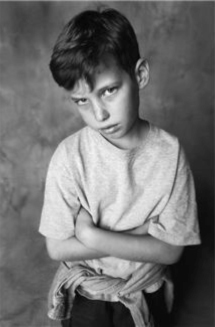Children who are Neglected
Children who are neglected feel as if they have been abandoned by their parents or those who care for them. They are children whose parents are simply unavailable. The parents may be present physically, but they may be unavailable emotionally, and may fail to take basic care of their children (Fig. 1).
Figure 1. A neglected boy
Child neglect falls under two broad categories:
- Physical neglect: children who are physically neglected are completely ignored by their primary caregivers. The primary caregiver fails to provide the child with the basic necessities of life. This includes:
- Parent does not provide good supervision of the child: the child is left home alone, or allowed to play outside where it may not be safe;
- Parent does not provide enough food (for example, the child may not be given enough food to eat);
- Parent continuously fails to pick the child up from school, or continuously arrives to school very late;
- Parent fails to provide child with basic healthcare. This is not related to income. The parent may be able to provide the child with healthcare, but chooses not to so. Parents who do so may fail to take the child to the dentist or to a pediatrician for regular check-ups and may choose not to take the child for immunization shots (not because the parent does not believe in the immunization of children, but because he or she simply cannot be bothered to take his or her child to the clinic).
Emotional neglect: the parent may take care of the physical needs of the child, but completely ignore the child’s need for love, affection and security:
- Parent does not pay attention to the child, does not interact with the child and never tells the child that he or she is loved;
- Parent does not attend to the child when the child is sick or hurt;
- Parent does not provide a safe base and sense of security to the child.
Some children who are neglected suffer from non-organic failure to thrive (see full Glossary). These are children who do not develop well because of emotional reasons. The child feels so left out and alone, almost abandoned, that he or she literally stops growing. These children usually appear much younger than their chronological age.
Some of the indicators of physical neglect include:
- Child shows up for school with dirty clothes or inadequate clothing (for example, showing up for school in the middle of winter without a coat (Fig. 2));
- Child shows up for school with no school supplies (such as pens and notebooks);
- Child has poor dental hygiene;
- Child is very dirty and sometimes smells bad because he or she has not showered or bathed in several days or weeks;
- Child is always hungry, and may steal other children’s food;
- Child is always sleepy, because he or she has not been getting enough sleep at home;
- Child may be depressed, lethargic or apathetic (that is, the child may not display any feelings at all);
- Child may show aggressive behavior towards him- or herself and/or others (for example, child may hit or bite him/herself, or others);
- Child may destroy property (for example, child may destroy school property);
- Child may engage in self-stimulatory (see full ECI Glossary) behaviors, such as rocking back and forth;
Figure 2. Physical neglect
Some of the indicators of emotional neglect include:
- Child appears much younger than he or she actually is (non-organic failure to thrive (see full Glossary));
- Child refuses to eat and may appear very weak or frail;
- Child struggles with daily activities, such as playing and learning;
- Child may be very apathetic (that is the child may not display any feelings at all) or withdrawn (that is, the child may keep to him or herself) ;
- Child may be aggressive towards self and/or others (for example, the child may hit or bite him/herself or others);
- Child may be very clingy (that is, he or she may not want to leave his or her mother’s side);
- Child may form attachment to strangers, because he or she is starved for affection;
- Child may show great fear of typical situations (such as outdoor spaces);
- Child may appear overly anxious.
Physical and emotional neglect can have very negative effects on the developing child, especially in the following
- Cognition and academics: many children who are neglected do not perform as well as their peers on tests of cognitive functioning (such as IQ tests) (see full Glossary). They struggle with attention and concentration skills. They also do not perform as well as their peers in almost all academics areas, such as reading, writing and math. This is either because they are too lethargic and apathetic to participate in classroom activities, or because they were never taught how to behave in a school setting;
- Language and communication: many children who are neglected have poor language skills. They mostly use very simple language and may struggle with the understanding of complex and multi-step directions (for example: please go to the library, get a book and bring it here);
- Social/emotional: many children who are neglected have difficulties with their social/emotional skills:
- Social skills: they can be either too compliant (that is, they do everything they are told to do) or too defiant (that is, they do not do anything that they are told to do). They often do not know how to approach others, or how to react when others approach them, because they were never taught how. They are usually left alone at home, and therefore do not develop the social skills that most children develop just by interacting with their parents.
- Emotional skills: many children who are neglected struggle with identifying and labeling of emotions, both in themselves and others. Most have very low self-esteem and very poor self-confidence. Some even feel that their lives are not worth living because they may think: “If my mother does not love me, who will?”
- Mental health: many children who are neglected struggle the following mental health disorders:
- Depression (Fig. 3);
- Anxiety-based disorders, such as phobias;
- Enuresis (lack of bladder control) and/or encropesis (lack of bowel control);
- Suicidal thoughts and attempts;
- Eating disorders (such as anorexia nervosa or bulimia nervosa);
- Sleep disorders (such as not sleeping enough, or waking up frequently during the night).
Figure 3. Depression
Children who are neglected need our help. Their needs are just as important as the needs of those who have been abused. Physical and especially emotional deprivation can destroy the psychological health of the child, making him or her completely helpless and hopeless. These children could greatly benefit from the following services:
- Psychotherapy: this is what most children who are neglected need first and foremost. Most of them will need regular and sometimes intensive psychotherapy from a clinical psychologist. The psychologist will help them learn that they are worthwhile, that they matter and that they deserve everything good that life has to offer. The psychologist will also help them learn how to trust adults again. Family therapy may be recommended as well, if the child is still living with his or her biological family;
- School counseling: some children who are neglected could benefit from regular sessions from the school counselor, in addition to the sessions that they may be getting from a clinical psychologist. The school counselor can help these children manage their behaviors and feelings at school;
- Social worker: the social worker can help them with issues related to clothing and personal hygiene. The social worker can also make sure that the child has enough food to eat every day;
- Special education services: some children who are neglected, especially those who display developmental delays, could benefit from the help of the school’s special educator. The special educator will teach these children how to pay attention and get organized in order to learn how to read, write and do math.
In the classroom, teachers need to be aware that children who are neglected may act differently than others. They may be very passive in the classroom, and may refuse to participate in classroom activities. They may also act out and attack others. Some may steal pens, pencils and other school supplies from others. Teachers need to understand that these children need as much help and attention as any other child in the classroom. He or she may need to give these children extra attention, at least in the beginning, in order to establish a relationship with them and gain their trust. It is highly recommended that the teacher and the school counselor (and psychotherapist, if possible) work together. The teacher may be the only constant in the child’s life, and his or her role cannot be under stated.
To learn more about neglect, please visit the emotional abuse section of the birth to six course.



0 comments
Kick things off by filling out the form below.
Leave a Comment